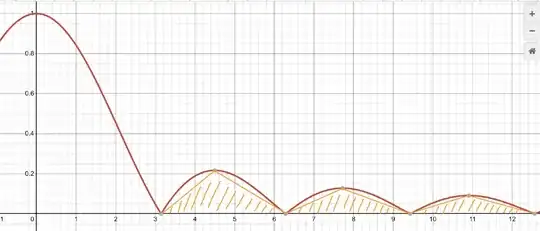Improper integral of $\sin(x)/x $ converges absolutely, conditionally or diverges?
We have $$\int_1^{\infty}\frac{\sin x}{x}\text{d}x$$
Integrating by parts $$u=\frac{1}{x}$$ $$\text{d}u=-\frac{1}{x^2}\text{d}x$$ $$\text{d}v=\sin x\;\text{d}x$$ $$v=-\cos x$$ $$ \begin{aligned} \int_1^{\infty} \frac{\sin x}{x} \text{d}x & = \frac{-\cos x}{x} \Big|_1^{\infty} - \int_1^{\infty} \frac{\cos x}{x^2} \text{d}x \\ & = \cos 1 - \int_1^{\infty} \frac{\cos x}{x^2} \text{d}x \end{aligned} $$
$\int_1^{\infty} \frac{\cos x}{x^2} \text{d}x$ converges absolutely (using the Comparison Test For Improper Integrals):
$$ \int_1^{\infty} \frac{|\cos x|}{x^2} \text{d}x < \int_1^{\infty} \frac{1}{x^2} \text{d}x $$
So $\int_1^{\infty} \frac{\sin x}{x} \text{d}x$ converges.
Now I need to find out if $\int_1^{\infty} |\frac{\sin x}{x}| \text{d}x$ converges or diverges.
